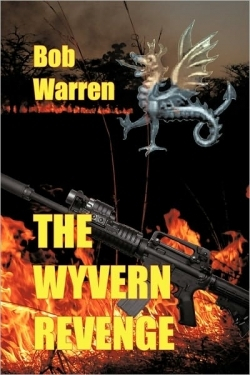The Wyvern Revenge
A little African history will enhance the reader’s appreciation for this first-rate novel. Most of the action—and there’s lots of it—takes place in Zimbabwe, formerly known as Southern Rhodesia, and then Rhodesia. During the 1950s and 1960s, the European powers granted freedom to their former colonies as they moved to African-majority rule. Rhodesia unilaterally declared its independence in 1965 under a White-minority government led by Ian Smith. A civil war followed with an unsettled security situation, far-flung violence, and high tensions throughout the country. The war sputtered to a conclusion in 1980 when an African-majority government under Robert Mugabe took over in a ceremony attended by Charles, Prince of Wales, and other foreign dignitaries. The name of the country was changed from Rhodesia to Zimbabwe and its capital city from Salisbury to Harare.
Under Mugabe’s increasingly dictatorial rule, the control of farming by white settlers was a source of tension. Forcible and bloody redistribution of the land took place, led by so called “war veterans” and youth militia. Today, there is practically no arable land owned by white Rhodesians, most of whom fled the country. Once the “breadbasket of Africa,” Zimbabwe is now a food-impoverished, failed state, ravaged by inflation, disease, and unemployment.
The strange title of the book, The Wyvern Revenge, is explained on its last page when protagonist Harry Andrews tells us that the “wyvern” is a mythical creature—a dragon—and is his family crest. By his murderous revenge against those who violently took over his farm with dire consequences for his family, he has “redeemed” this symbol. Harry and his friend, Peter Templar, are two white settlers who established farms in Rhodesia, but they were inexorably caught up in the unbridled passions that swept over the country.
Author Warren is clearly familiar with the dreadful events that prevailed during the recent history of Rhodesia-Zimbabwe. His knowledge is tainted by his bias in favor of the country’s white settlers who were once dominant even though they were a minority. Their sincere but narrow-minded belief was that the black natives were not ready for independence, and so they closed their eyes to the inevitability of majority rule. Warren has embraced this view, putting it forward vigorously through his fictional account of the tragedies that beset Harry, Peter, and their families. His negative attitude is also reflected in his portrayal of Kenneth Kaunda, the first president of Zambia, formerly Northern Rhodesia, who served from 1964 to 1991 when he was defeated in a multi-party election.
In the book, Peter’s father and his colleagues are imprisoned in Zambia, the scene providing an opportunity for Warren to describe a sensational rescue attempt mounted by Harry and Peter. This well-narrated episode, taken together with the appalling experiences of Harry and his family, will rivet the readers’ attention. However, readers must be aware that this is no stand-alone thriller. It tells a rousing story, but it also conveys a prejudicial point of view that needs to be fully understood. Those who are stimulated to look into the history of Africa and its move from colonialism to nationhood will bring to the book an informed familiarity that will enrich their appreciation of Warren’s spirited contribution.
Reviewed by
Morton I. Teicher
Disclosure: This article is not an endorsement, but a review. The publisher of this book provided free copies of the book and paid a small fee to have their book reviewed by a professional reviewer. Foreword Reviews and Clarion Reviews make no guarantee that the publisher will receive a positive review. Foreword Magazine, Inc. is disclosing this in accordance with the Federal Trade Commission’s 16 CFR, Part 255.

